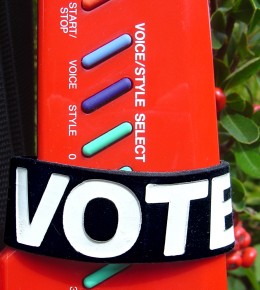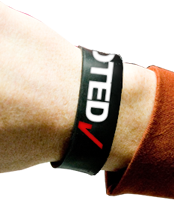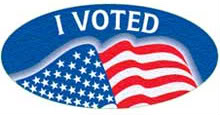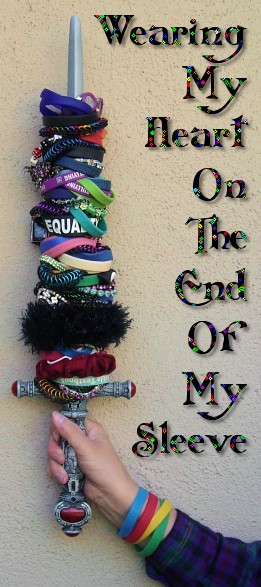 This is the “I Voted” wristband from Rock the Vote — an organization dedicated to engaging and building political power for young people here in the United States (yes, this will be a very USA-centric posting) at a time when their and others’ voting rights are under attack — being modeled by my son Arthur’s red ’80′s Yamaha SHS-10 Keytar (click the picture to see the rest of the keytar).
This is the “I Voted” wristband from Rock the Vote — an organization dedicated to engaging and building political power for young people here in the United States (yes, this will be a very USA-centric posting) at a time when their and others’ voting rights are under attack — being modeled by my son Arthur’s red ’80′s Yamaha SHS-10 Keytar (click the picture to see the rest of the keytar).
 I know the above picture makes it look like the wristband just says “VOTE”, but as you can see from this product image from the Rock the Vote store, it actually does say “I VOTED” with a red checkmark after it. These are the type of wristbands that have a taller band more like a cuff bracelet than the standard bangle-sized wristbands, and the text is both embossed and printed with very glossy ink.
I know the above picture makes it look like the wristband just says “VOTE”, but as you can see from this product image from the Rock the Vote store, it actually does say “I VOTED” with a red checkmark after it. These are the type of wristbands that have a taller band more like a cuff bracelet than the standard bangle-sized wristbands, and the text is both embossed and printed with very glossy ink.
 Every time there’s an election, for the rest of the day after voting I proudly go around wearing one of the “I Voted” stickers they give out at the polling places (though occasionally having to reattach it to my shirt after detaching it from my hair), so when I saw these wristbands I really liked the idea of having something I could wear all week or all month to celebrate and promote having voted (hopefully accompanied by election results worth celebrating as well).
Every time there’s an election, for the rest of the day after voting I proudly go around wearing one of the “I Voted” stickers they give out at the polling places (though occasionally having to reattach it to my shirt after detaching it from my hair), so when I saw these wristbands I really liked the idea of having something I could wear all week or all month to celebrate and promote having voted (hopefully accompanied by election results worth celebrating as well).
When the United States Constitution was written, only white male property owners had the right to vote, and every other group has had to fight to win the right to vote. Some groups — for example, prisoners and felons — are still struggling for the right to vote, and the voting rights of other groups are currently under attack. To quote from the Brennan Center for Justice’s Executive Summary of their Voting Law Changes in 2012 publication:
Over the past century, our nation expanded the franchise and knocked down myriad barriers to full electoral participation. In 2011, however, that momentum abruptly shifted.
State governments across the country enacted an array of new laws making it harder to register or to vote. Some states require voters to show government-issued photo identification, often of a type that as many as one in ten voters do not have. Other states have cut back on early voting, a hugely popular innovation used by millions of Americans. Two states reversed earlier reforms and once again disenfranchised millions who have past criminal convictions but who are now taxpaying members of the community. Still others made it much more difficult for citizens to register to vote, a prerequisite for voting.
These new restrictions fall most heavily on young, minority, and low-income voters, as well as on voters with disabilities.
And to focus more on the young voters served by Rock the Vote, here’s a quote from the October 10 2011 New York Times editorial The Myth of Voter Fraud:
Some of the desperate Republican attempts to keep college students from voting are almost comical in their transparent partisanship. No college ID card in Wisconsin meets the state’s new stringent requirements (as lawmakers knew full well), so the elections board proposed that colleges add stickers to the cards with expiration dates and signatures. Republican lawmakers protested that the stickers would lead to — yes, voter fraud.
Other states are beginning to require documentary proof of citizenship to vote, or are finding other ways to make it harder to register. Some are cutting back on programs allowing early voting, or imposing new restrictions on absentee ballots, alarmed that early voting was popular among black voters supporting Barack Obama in 2008. In all cases, they are abusing the trust placed in them by twisting democracy’s machinery to partisan ends.
As a woman who knows how hard our feminist foremothers had to fight for the right to vote during my grandparents’ lifetimes, and who saw the passing of the crucial civil-rights legislation The Voting Rights Act of 1965 during my own lifetime and considers the new voting restrictions to be shameful attacks on both the spirit and letter of the law, I consider it a sacred duty for all of us to vote in every election, to make our voices heard and to work to elect people who will defend our voting rights and other rights.
 Getting back to the keytar picture, VOTE! To be corny about it, if even a keytar has buttons to select voice and style, you can certainly go to your polling place (or fill out your absentee ballot) and push the buttons (or the touchscreen, or punch or fill in the selections on your voting card) to vote for people who will make your voice heard and whose style (not talking superficialities here but general philosophy, approach, and actions) best serves us all.
Getting back to the keytar picture, VOTE! To be corny about it, if even a keytar has buttons to select voice and style, you can certainly go to your polling place (or fill out your absentee ballot) and push the buttons (or the touchscreen, or punch or fill in the selections on your voting card) to vote for people who will make your voice heard and whose style (not talking superficialities here but general philosophy, approach, and actions) best serves us all.
 If you’re not registered to vote, you can go to Rock the Vote’s Voter Registration Page for help. They also have helpful information on voting as a student, absentee ballots, finding your polling place, and many other important issues.
If you’re not registered to vote, you can go to Rock the Vote’s Voter Registration Page for help. They also have helpful information on voting as a student, absentee ballots, finding your polling place, and many other important issues.
Some Related Articles and Web Pages
The Voter Fraud Fraud, by Andrew Rosenthal in the November 7, 2011, New York Times.
This week in the War on Voting: Eric Holder engages, a December 17, 2001, Daily Kos article by Joan McCarter.
A Fraudulent Case: The ugly parallels between Jim Crow and modern vote-suppression laws, an October 20, 2011, Slate article by Risa L. Goluboff and Dahlia Lithwick.
In Memoriam of Those Who Died for the Right to Vote, an NAACP Facebook album of pictures and stories commemorating some of those who were killed for working to protect voting rights in the 1950′s and 1960′s.
Defending Democracy: Confronting Modern Barriers to Voting Rights in America, an NAACP article and report.
Voter identification laws are discriminatory and should be abolished, a New York Daily News column by Margaret Fung, executive director of the Asian American Legal Defense and Education Fund.
Attorney General Eric Holder’s December 13, 2011, speech on voting rights, given at the Lyndon Baines Johnson Library & Museum — “the right to vote is the basic right, without which all others are meaningless” – President Lyndon Baines Johnson.
No One in America Should Have to Wait 7 Hours to Vote, by Andrew Cohen, November 5, 2012, on The Atlantic web site.
Problems at the Polls, by David Firestone in the November 6, 2012, New York Times.
The Stand 4 Freedom site has a lot of information and resources about protecting all Americans’ right to vote.
October 2012 Update
Ever since turning 18 I’ve enjoyed fulfilling my civic duty via the ritual of going to my local polling place to vote on Election Day, but this year, considering (1) all the talk I was hearing about early voting, (2) my curiosity about how early voting actually worked, and (3) the fact that early voting started here in Santa Cruz as early as October 9, which would give me almost a whole month to wear my “I Voted” bracelet and talk about early voting and other election issues with people who asked about it :-), I stopped by the Santa Cruz County Building for some early voting on the way to my son Arthur’s improv class.
Basically, after making me cover my chest with a magazine :-) (for both the 2008 and 2012 US Presidential elections, I’ve worn one or another of my Obama shirts every day for the last three or so months leading up to the election), they handed me an absentee ballot (another thing I had had no previous experience with) with my info printed on the envelope, and I went to a voting booth/station out in the hall to fill it out. And then turned it in, and yes, have since then enjoyed wearing my “I Voted” bracelet and sticker and talking with people about early voting and the election.
updated November 6, 2012

{ 0 comments… add one now }